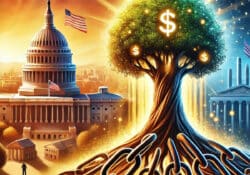

Money systems at the root of omnicide
by Prof Jem Bendell | Oct 28, 2023
Poly, perma, meta, multi, omni… social commentators today like to put a prefix in front of ‘crisis’. Their common idea is that something generically bad is happening in modern societies. Whatever their prefix, using the word ‘crisis’ is misleading, as it suggests those bad things can be overcome. But most of them can’t, as shown by research on the global causes of the global disruptions, chronicled in my new book. Instead, there is a general breaking of the economic, political and environmental systems that maintain modern life. To recognize that is to open a can of worms – including a judgement against the systems, hierarchies and worldviews which brought us to this point. Which is why the commentators for mainstream media, and populist alternative media, will keep saying we are in the ‘whatever-crisis’. One problem with their rhetoric is it delays the potential learning about how we got into this mess, and delays a rethinking of priorities ahead of further declines, breakdowns and collapse.
In my book Breaking Together I explain how monetary systems are both the underlying reason we got into this mess and the reason we can’t get out of it. That mess is total, as we humans are manipulated, coerced and rewarded to feel, think and behave in ways that oppress and destroy all life… a kind of omnicide. One example is how an expansionist monetary system not only empowers all corporations to grow, but also necessitates them to grow, including those involved in making war. Therefore, rather than us humans becoming more violent over time, the logic of the system demands more war. These monetary systems are also the reason why elites in corporations and governments will make matters more difficult, as biophysical and economic systems further degrade.
If we want to help achieve peace, to reduce harm, defend our freedoms, and save more of the natural world, then we need to understand money systems properly: because the problem is much larger than simply our increasing dependence on electronic transactions. In Chapter 10, I explore the many ways that expansionist monetary systems turn us all into oppressors and exploiters of ourselves, each other and wider nature. I list some of these in a table below, but the detail and references are in the chapter itself, called “Freedom from banking – how the money-power drove collapse.” The chapter is now available as a free audio. Below follows an excerpt, which summarises what is explained in detail in earlier in that chapter.
It would be a mistake to think that we are faced with many of the Matrix’s ‘Agent Smiths’ coming from all directions when it’s just one code that produces all the blows. That code is the monetary system, maintained by the network of people and institutions that constitute the money-power. Focusing only on one crisis or another will do little to help. Focusing on individual abuses by organisations or individuals will never change the code. The idea that there is one cabal in charge is unhelpful as all the officers and agencies of the money-power are interchangeable. Playing ‘whack-a-mole’ against the latest abuses and strange pronouncements of globalists might gain YouTube views, but does not build a coherent agenda. Worse, it reflects the obsession with individuals which is itself produced by Imperial Modernity and disables our ability to see the real structures of power (Chapter 8).
Instead, we can recognise how the delusional story that wealth is separate from nature, has been embedded within our monetary, banking and financial systems, to then provide a basis for more stories to deepen and widen the delusion of separation between us and nature. In modern times, global corporations have been the conduits for those stories and for increasing the destruction. They are essentially psychopathic entities that administer a global system of Imperial Modernity that manipulates all aspects of life. I say literally psychopathic, because the personality traits include a callous unconcern for the feelings of others, an incapacity to maintain enduring relationships, a disregard for the safety of others, deceitfulness for personal gain, the incapacity to experience guilt and the failure to conform to social norms.[i]
In the distant past, money was a specialised tool and a useful servant of humanity. But can you imagine a worse ruler than one who regards the world as merely an instrument for his own expansion? Through centuries of violence, this ruler has established systems that cajole us into aspiring for more hallucinated wealth, so that we oppress each other and destroy our planetary home. This Imperial Modernity is not just a dominator culture, it is a destroyer culture;[ii] because we cannot be dominated unless they destroy our original wealth and wellbeing: our trust, our peace of mind, our access to freely available abundance and our freedom of choice. Centuries ago, through debt, the money-power destroyed the peace and security of the Spanish sailors who became violent conquistadors. Then the endless hunger for gold and silver destroyed the cultures of the colonised, as it continues to do today. Now it destroys our capability to freely choose our collective endeavours through our governments. It destroys our ability to be well informed and have the time to discover who we are and how we might wish to live. It hampers public dialogue so we cannot discuss ideas without using the idiot binaries that emerge on most issues. And deep down, despite the resistance of people like the grandmothers of Bali (who I described at the start of Chapter 12), it continues to destroy our understanding of wealth. Because only by destroying original wealth does the money-power create the need for us to use its currencies of power. The destroyer culture should be seen for what it is—a death cult, that turns powerful life into pathetic symbols of power. As Vandana Shiva summarises: “nature shrinks as capital grows.”[iii]
The destruction cannot continue for much longer. The growth imperative that arises from the monetary system means that modern societies will collapse harder and faster than otherwise. The vulnerability of contemporary societies is increased due to the way the momentum of economic growth is embedded into our institutional structures. Benjamin Friedman suggested we think of modern societies as a bicycle, with economic growth being the forward momentum that keeps the wheels spinning. As long as the wheels of a bicycle are spinning rapidly, it is a stable vehicle. When the wheels slow a lot, perhaps as the result of economic stagnation, he argues that political democracy, individual liberty and social tolerance are then greatly at risk even in countries where the absolute level of material prosperity remains high.[iv] The way that the fracturing of one foundation of a society can cause a chain reaction and a ‘downward spiral’ has been called a ‘catabolic collapse’ in scholarship on past collapses.[v] This perspective has arisen in mainstream think tank talk in the UK in the warning of there being a potential ‘doom loop’ of cascading disruptions.[vi]
The chapter is the result of 15 years of my work on the societal implications of monetary systems, so I’m particularly pleased with it. I hope it will influence some of you towards engaging in alternatives – some of which are discussed in Chapter 12 of the book, and more info on which I will include in future essays on this blog.
You can listen to Chapter 10 here, or purchase the whole audio book. The epub is free to download along with other purchase options.
Table 1: How expansionist monetary systems enslave us
Expansionist monetary systems, where private banks issue a nation’s monetary supply as interest-bearing debt:
- Are controlled by banks and thus they badly serve small businesses and pour the majority of new money (as loans) into property mortgages, thereby inflating accommodation costs, which indebts the population and raises rents. In turn, that shapes people’s choice of work (and therefore education) and lack of spare time. This unfreedom of economic precarity limits community life and political life.
- Require interest payments that can compromise the moral agency of debtors due to panic about how compound interest can lead to life-changing losses. That happens today, but a powerful example from history were the brutal conquistadors in the Americas, who enslaved and destroyed the Aztecs. Studies found that the Spanish sailors were tricked into huge debts, and therefore desperately sought large amounts of silver and gold.
- Promote restrictive paradigms like patriarchy, modernity and an objectifying approach to nature, because the issuers of new money favour certain attitudes and behaviours that produce high returns with low risk. For instance, will a bank manager lend to a shaman or a property developer?
- Empower corporations, which are instituted according to psychopathic principles (instrumentalising people to seek maximum gain)
- Encourage such corporations to increase their cost externalising, profit maximising and monopolist strategies, because they enable leveraged buy outs.
- Made exploitative forms of economic globalisation possible by lending to corporations to help them go global.
- Require perpetual growth, which has never been decoupled from energy and resources, which is bad for the environment, but also leads to the constant creation of wants through advertising, with damaging effects on our psyche (e.g. USA kids see 40,000 ads per year).
- Ultimately distort what values and movements exist in society. Imagine what would society look like if people had been able to explore their ideas for how to live and produce? The personal history of boomers and of current digital nomads suggest greater possibilities for people not enslaved by debts.
- Create a scarcity of money that increases our focus on money, thereby distorts=ing our psyches. For instance, psychological studies show that the rich are proportionately less generous, and other studies show how that reminding people of money reduces their honesty and ethics.
- Centralise wealth which renders democracy a charade (e.g. 737 firms control 87% of all the world’s corporations).
- Empower corporations to dominate knowledge domains and policy domains (via research institutions, thinktanks, and media). For instance, pharmaceutical firms dominate the understanding of health, so that complementary non-pharma approaches are ignored or suppressed.
- Promote war, as all arms manufacturers must expand their sales, which is only possible with war and the threat of war. That’s why in the 30 years since 1991, arms sales increased 40%. That is not because human nature is becoming more violent, but because the military industry influences governments, politics and media.
- Create the power of the international bond markets over government policies, thereby rendering national sovereignty a sham.
- Create total domination of payment systems by private firms (banks and payments providers), which control and monitor all transactions in an economy, holding the power of extrajudicial disruption of the transactions of people and organisations.
This list draws on the detailed discussion and evidence in Chapter 10. The list helps to highlight that humanity’s challenge is not to magically change our minds about commodification, consumerism and economic growth. To respond to the ‘omnicrisis’ (or whatever ‘crisis’ the mainstream wishes to describe the situation as), the need is not for a grand spiritual awakening around the world. That idea involves denying and demeaning the wisdom and dignity of people around the world who are less embedded within exploitative systems. Instead, more of us can recognise how our minds are shaped and controlled by an expansionist monetary system: we are enslaved, from birth to death. Therefore, more people need to be freed from expansionist monetary systems, so their original natures can express themselves in harmony with wider life. Ignoring this situation of enslavement by an expansionist monetary is to be complicit in it.
Subscribe to Prof Jem Bendell
References
[i] Schneider, K. J. (2014). The Peril Is Not Mental Illness but the Polarized Mind. Psychology Today. https://www.psychologytoday.com/us/blog/awakening-awe/201403/the-peril-is-not-mental-illness-the-polarized-mind
[ii] Associated with critiques of patriarchy, the term ‘dominator culture’ refers to a form of society where fear and force maintain a rigid hierarchical structure. Riane Eisler (1987). The Chalice and the Blade. Harper Collins.
[iii] Shiva, V. (2015). Soil Not Oil: Environmental Justice in an Age of Climate Crisis. North Atlantic Books.
[iv] Friedman, B. M. (2005). The moral consequences of economic growth. Penguin Random House.
[v] Greer, J. M. (2005). How Civilizations Fall: A Theory of Catabolic Collapse. Ecoshock. https://www.ecoshock.org/transcripts/greer_on_collapse.pdf
[vi] Laybourn, L.; Throp, H. & Sherman, S. (2023). 1.5°C – dead or alive? The risks to transformational change from reaching and breaching the Paris Agreement goal. IPPR. https://www.ippr.org/research/publications/1-5c-dead-or-alive





0 Comments